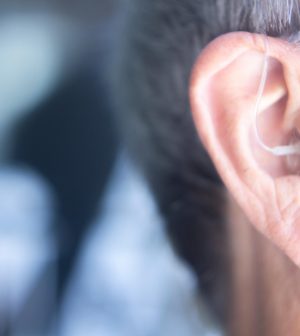- Could Your Grocery Store Meat Be Causing Recurring UTIs?
- Are You Making This Expensive Thermostat Error This Winter?
- Recognizing the Signs of Hypothyroidism
- 10 Strategies to Overcome Insomnia
- Could Artificial Sweeteners Be Aging the Brain Faster?
- Techniques for Soothing Your Nervous System
- Does the Water in Your House Smell Funny? Here’s Why
- Can a Daily Dose of Apple Cider Vinegar Actually Aid Weight Loss?
- 6 Health Beverages That Can Actually Spike Your Blood Sugar
- Treatment Options for Social Anxiety Disorder
Hearing Troubles Can Affect the Mind, Too

If you’re over 65, you likely struggle sometimes to hear conversations clearly, but ignoring that may prompt even more serious health problems, experts say.
If left unchecked, hearing loss can lead to social isolation and depression — two conditions known to raise dementia risk, said Dr. Leah Ross, a physician in the Division of Geriatric Medicine at Penn State Health’s Milton S. Hershey Medical Center.
Hearing impairment is the third most common chronic condition faced by older adults, Ross said. Yet, only 20% of these folks have had a hearing test in the past five years, according to the American Speech-Language-Hearing Association. While more than half of adults acknowledge they struggle with hearing problems, only 11% have sought treatment.
“A lot of times, people are suffering with hearing impairment for years before they even say anything to their doctors,” Ross noted in a Penn State news release.
The good news?
“It is a modifiable risk factor,” Ross said. “There’s something we can do about it.”
What’s missed by not treating hearing loss is what it can trigger, Ross explained. In her practice, she often sees this familiar scenario: An older adult with hearing loss discovers his or her hearing has declined to the point where they have trouble understanding conversations. They start to skip social events and stay at home, as their world shrinks and they become depressed.
What can you do to avoid this fate?
A National Institutes of Health study in 2023 found that participants with dementia and hearing loss saw an almost 50% reduction in their rate of thinking declines simply by wearing hearing aids.
All hearing impairments are not the same, Ross noted, and doctors can help diagnose the cause and the right treatment. Depending on the type of hearing impairment, surgery could be an option. For example, cochlear implants can help some people hear better.
If a hearing aid is the way to go, “the more often they wear it, the better,” Ross said. “I have a number of patients who have hearing aids and they don’t wear them.”
While some hearing aids are expensive, “a lot of changes have happened in recent years,” Ross stressed, and some hearing aids that can be bought over-the-counter or online no longer cost as much.
Whatever treatment you choose, take your hearing loss seriously.
“That’s the big thing I have to battle in clinic,” Ross said. “People aren’t connecting [the] seriousness of hearing impairment because it’s so common. People don’t connect the downstream effects of what can happen.”
More information
Johns Hopkins Medicine has more on hearing loss.
SOURCE: Penn State Health, news release, Feb. 4, 2024
What This Means for You
If you suffer from hearing loss, an expert says don’t delay in getting a diagnosis and hearing aids, because not treating it can lead to even more serious health problems like depression and dementia.
Source: HealthDay
Copyright © 2026 HealthDay. All rights reserved.










